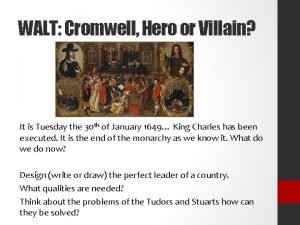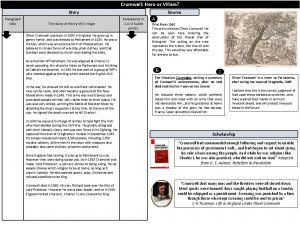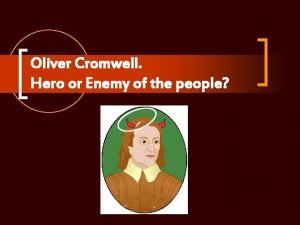Cromwell Hero or Villain Story Paragraph title The


- Slides: 2

Cromwell: Hero or Villain? Story Paragraph title The story of Henry VIII’s reign Oliver Cromwell was born in 1599 in England. He grew up in gentry family, and was elected to Parliament in 1628. He was a Puritan, which was an extreme form of Protestantism. He believed in simple forms of worship, plain clothes, and that Sundays were devoted to church and reading the bible. As a member of Parliament, he was angered at Charles I’s lavish spending, his refusal to listen to Parliament and his liking of Catholic ceremonies. In 1640 he was part of a group of MP’s who rebelled against the king which started the English Civil War. In the war, he showed his skill as a brilliant commander. He rose up the ranks, and soon became a general of the New Model Army made in 1645. This army was well trained, and promoted people on their skill, rather than on their status. He was also very skilled, winning the Battle of Marston Moor by attacking the King’s supporters at tea time. At the end of the war, he signed the death warrant to kill Charles I. In 1649 he was put in charge of armies to help fight the Irish who had rebelled during the Civil War. He greatly disagreed with their Catholic views, and was very fierce in his fighting. He captured the town of Drogheda in Ireland in September 1649. His troops massacred nearly 3, 500 people, including 2, 700 royalist soldiers, all the men in the town with weapons and probably also some civilians, prisoners and priests. Since England had no king, it was up to Parliament to rule. However they were doing a poor job, so in 1653 Cromwell was made ‘Lord Protector’, a job very similar to being a king. He let people choose which religion to be at home, as long as it wasn’t Catholic. He also banned sports, pubs, Christmas and refused a petition to be King. Cromwell died in 1658. His son, Richard took over the title of Lord Protector. However he was a poor leader, and so in 1660 England invited Charles II, Charles I’s son, to become King. Source Summarise in 1 or 2 bullet points. A Print from 1661 This print criticises Oliver Cromwell. He can be seen here ordering the destruction of the ‘Royall Oak of Brittayne’. The writing on the tree represents the crown, the church and the law. This would be very affordable for anyone to buy. B C The Historian Clarendon, writing a summary of Cromwell’s achievements, after he had died and Charles II was on the throne He reduced three nations, which perfectly hated him and ruled with an army that were not devoted to him…But his greatness at home was a shadow of the glory he had abroad. France, Spain and others feared him. Oliver Cromwell in a letter to Parliament, after taking the town of Drogheda, 1649 I believe that this is the correct judgment of God upon these barbarous wretches, who have washed their hands in so much innocent blood, and will protect innocent blood in the future. Scholarship “Cromwell had commanded enough following and respect to enable the processes of government well… and had begun to set about giving his rule a base among the people. And while he was religious like Charles I, he was also practical, who did not wait on God. ” Adapted from G. E. Aylmer, Rebellion or Revolution "Cromwell shut many inns and theatres were all closed down. Most sports were banned. Boys caught playing football on a Sunday could be whipped as a punishment. Swearing was punished by a fine, though those who kept swearing could be sent to prison” C N Trueman, Life In England Under Oliver Cromwell

Cromwell: Hero or Villain? Story Paragraph title Religious beliefs The story of Henry VIII’s reign Source Summarise in 1 or 2 bullet points. Oliver Cromwell was born in 1599 in England. He grew up in gentry family, and was elected to Parliament in 1628. He was a Puritan, which was an extreme form of Protestantism. He believed in simple forms of worship, plain clothes, and that Sundays were devoted to church and reading the bible. As a member of Parliament, he was angered at Charles I’s lavish spending, his refusal to listen to Parliament and his liking of Catholic ceremonies. In 1640 he was part of a group of MP’s who rebelled against the king which started the English Civil War. In the war, he showed his skill as a brilliant commander. He rose up the ranks, and soon became a general of the New Model Army made in 1645. This army was well trained, and promoted people on their skill, rather than on their status. He was also very skilled, winning the Battle of Marston Moor by attacking the King’s supporters at tea time. At the end of the war, he signed the death warrant to kill Charles I. In 1649 he was put in charge of armies to help fight the Irish who had rebelled during the Civil War. He greatly disagreed with their Catholic views, and was very fierce in his fighting. He captured the town of Drogheda in Ireland in September 1649. His troops massacred nearly 3, 500 people, including 2, 700 royalist soldiers, all the men in the town with weapons and probably also some civilians, prisoners and priests. Since England had no king, it was up to Parliament to rule. However they were doing a poor job, so in 1653 Cromwell was made ‘Lord Protector’, a job very similar to being a king. He let people choose which religion to be at home, as long as it wasn’t Catholic. He also banned sports, pubs, Christmas and refused a petition to be King. Cromwell died in 1658. His son, Richard took over the title of Lord Protector. However he was a poor leader, and so in 1660 England invited Charles II, Charles I’s son, to become King. 1) Match the following titles to the paragraphs: Religious beliefs, Death, Leader of the New Model Army, Lord Protector, Anger with the King, War in Ireland 2) Highlight 2 facts that show this title to be true A Woodcut Print from 1661 This print criticises Oliver Cromwell. He can be seen here ordering the destruction of the ‘Royall Oak of Brittayne’. The writing on the tree represents the crown, the church and the law. This would be very affordable for anyone to buy. B When was this source made? Why do you think it criticises Cromwell? C The Historian Clarendon, writing a summary of Cromwell’s achievements, after he had died and Charles II was on the throne He reduced three nations, which perfectly hated him and ruled with an army that were not devoted to him…But his greatness at home was a shadow of the glory he had abroad. France, Spain and others feared him. Do you think Clarendon is complementing or criticising Cromwell? Why? Oliver Cromwell in a letter to Parliament, after taking the town of Drogheda, 1649 I believe that this is the correct judgment of God upon these barbarous wretches, who have washed their hands in so much innocent blood, and will protect innocent blood in the future. What are Oliver Cromwell’s motivations for taking Drogheda? Why is it important to him? Scholarship “Cromwell had commanded enough following and respect to enable the processes of government well… and had begun to set about giving his rule a base among the people. And while he was religious like Charles I, he was also practical, who did not wait on God. ” Adapted from G. E. Aylmer, Rebellion or Revolution "Cromwell shut many inns and theatres were all closed down. Most sports were banned. Boys caught playing football on a Sunday could be whipped as a punishment. Swearing was punished by a fine, though those who kept swearing could be sent to prison” C N Trueman, Life In England Under Oliver Cromwell 1) Identify if the interpretation is positive or negative 2) Highlight 2 sentences which show they are positive/negative


